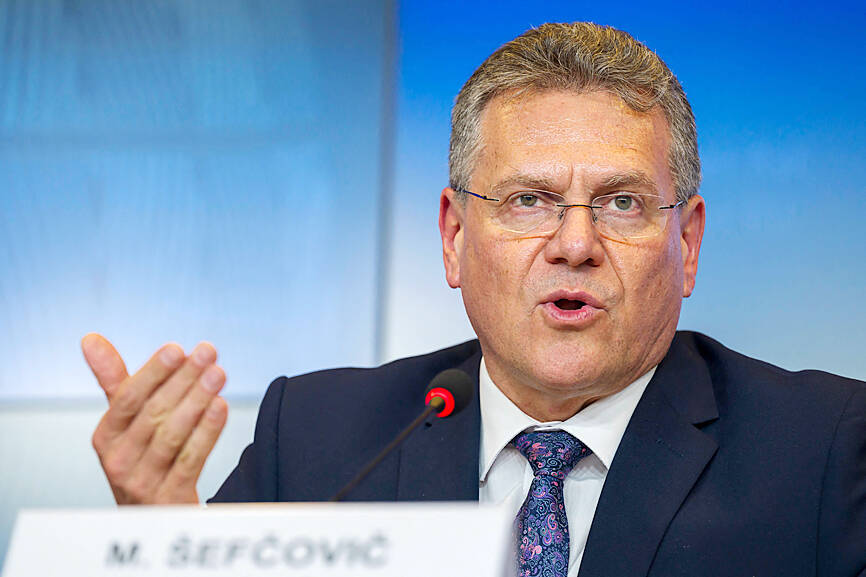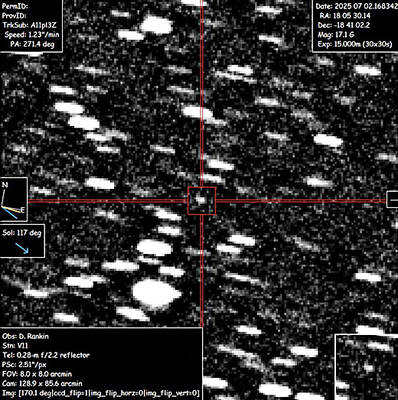China is reaching out to other nations as the US layers on more tariffs, in what appears to be an attempt by Beijing to form a united front to compel Washington to retreat.
Days into the effort, it is meeting only partial success from countries unwilling to ally with the main target of US President Donald Trump’s trade war.
Facing the cratering of global markets, Trump on Wednesday backed off his tariffs on most nations for 90 days, saying countries were lining up to negotiate more favorable conditions.

Photo: AP
China has refused to seek talks, saying the US was insincere and that it would “fight to the end” in a tariff war, prompting Trump to further jack up the tax rate on Chinese imports to 125 percent. China has retaliated with tariffs on US goods of 84 percent, which took effect yesterday.
Trump’s move was seemingly an attempt to narrow what had been an unprecedented trade war between the US and most of the world to a showdown between the US and China.
China has thus far focused on Europe, with a phone call between Chinese Premier Li Qiang (李強) and European Commission President Ursula von der Leyen “sending a positive message to the outside world.”

Photo: AFP
The two are each other’s largest trading partners.
“China is willing to work with the EU to jointly implement the important consensus reached by the leaders of China and the EU, strengthen communication and exchanges, and deepen China-EU trade, investment and industrial cooperation,” China’s state-run Xinhua news agency reported.
That was followed by a video conference between Chinese Minister of Commerce Wang Wentao (王文濤) and EU Commissioner for Trade and Economic Security Maros Sefcovic on Tuesday to discuss the US’ “reciprocal” tariffs.
Wang said the tariffs “seriously infringe upon the legitimate interests of all countries, seriously violate WTO rules, seriously damage the rules-based multilateral trading system and seriously impact the stability of the global economic order,” Xinhua said.
“It is a typical act of unilateralism, protectionism and economic bullying,” Wang was quoted as saying.
“China is willing to resolve differences through consultation and negotiation, but if the US insists on its own way, China will fight to the end,” Wang said.
Wang has also spoken with the 10-member ASEAN, while Li has met with business leaders.
China has “already made a full evaluation and is prepared to deal with all kinds of uncertainties, and will introduce incremental policies according to the needs of the situation,” Xinhua quoted Li as saying.
Not all countries are interested in linking up with China, especially those with a history of disputes with Beijing.
“We speak for ourselves, and Australia’s position is that free and fair trade is a good thing,” Australian Prime Minister Anthony Albanese told reporters.
“We engage with all countries, but we stand up for Australia’s national interest and we stand on our own two feet,” he added.
China imposed a series of official and unofficial trade barriers against Australia in 2020 after then-Australian prime minister Scott Morrison’s government angered Beijing by calling for an independent inquiry into the COVID-19 pandemic.
India has also reportedly turned down a Chinese call for cooperation, and Russia, typically seen as China’s closest geopolitical partner, has been left out of the Trump tariffs altogether.
Yet, Southeast Asian nations such as Vietnam and Cambodia find themselves in a particular bind. They benefited when factories moved to their countries from China due to rising costs. They are being hit by punishing tariffs, but have few buyers outside the US and are already operating on razor-thin margins.
Trump had previously denied contemplating a pause, but the drama over his tariffs would continue as the administration prepares to engage in country-by-country negotiations.
Meanwhile, tariffs would be 10 percent for the countries where the larger ones were paused.

Two former Chilean ministers are among four candidates competing this weekend for the presidential nomination of the left ahead of November elections dominated by rising levels of violent crime. More than 15 million voters are eligible to choose today between former minister of labor Jeannette Jara, former minister of the interior Carolina Toha and two members of parliament, Gonzalo Winter and Jaime Mulet, to represent the left against a resurgent right. The primary is open to members of the parties within Chilean President Gabriel Boric’s ruling left-wing coalition and other voters who are not affiliated with specific parties. A recent poll by the

TENSIONS HIGH: For more than half a year, students have organized protests around the country, while the Serbian presaident said they are part of a foreign plot About 140,000 protesters rallied in Belgrade, the largest turnout over the past few months, as student-led demonstrations mount pressure on the populist government to call early elections. The rally was one of the largest in more than half a year student-led actions, which began in November last year after the roof of a train station collapsed in the northern city of Novi Sad, killing 16 people — a tragedy widely blamed on entrenched corruption. On Saturday, a sea of protesters filled Belgrade’s largest square and poured into several surrounding streets. The independent protest monitor Archive of Public Gatherings estimated the

Irish-language rap group Kneecap on Saturday gave an impassioned performance for tens of thousands of fans at the Glastonbury Festival despite criticism by British politicians and a terror charge for one of the trio. Liam Og O hAnnaidh, who performs under the stage name Mo Chara, has been charged under the UK’s Terrorism Act with supporting a proscribed organization for allegedly waving a Hezbollah flag at a concert in London in November last year. The rapper, who was charged under the anglicized version of his name, Liam O’Hanna, is on unconditional bail before a further court hearing in August. “Glastonbury,

FLYBY: The object, appears to be traveling more than 60 kilometers per second, meaning it is not bound by the sun’s orbit, astronomers studying 3I/Atlas said Astronomers on Wednesday confirmed the discovery of an interstellar object racing through the solar system — only the third-ever spotted, although scientists suspect many more might slip past unnoticed. The visitor from the stars, designated 3I/Atlas, is likely the largest yet detected, and has been classified as a comet, or cosmic snowball. “It looks kind of fuzzy,” said Peter Veres, an astronomer with the International Astronomical Union’s Minor Planet Center, which was responsible for the official confirmation. “It seems that there is some gas around it, and I think one or two telescopes reported a very short tail.” Originally known as A11pl3Z before